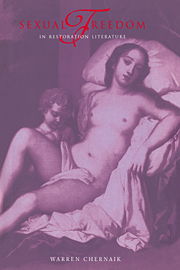Book contents
- Frontmatter
- Contents
- Acknowledgements
- Introduction: the imperfect enjoyment
- 1 Hobbes and the libertines
- 2 The tyranny of desire: sex and politics in Rochester
- 3 Absent from thee
- 4 Playing trick for trick: domestic rebellion and the female libertine
- 5 My masculine part: Aphra Behn and the androgynous imagination
- Conclusion
- Notes
- Index
4 - Playing trick for trick: domestic rebellion and the female libertine
Published online by Cambridge University Press: 04 September 2009
- Frontmatter
- Contents
- Acknowledgements
- Introduction: the imperfect enjoyment
- 1 Hobbes and the libertines
- 2 The tyranny of desire: sex and politics in Rochester
- 3 Absent from thee
- 4 Playing trick for trick: domestic rebellion and the female libertine
- 5 My masculine part: Aphra Behn and the androgynous imagination
- Conclusion
- Notes
- Index
Summary
As Rochester's poems illustrate, the attitude of male authors toward female sexuality during this period is ambivalent and self-contradictory, with a marked aggressiveness one of its constituent elements. A particularly striking instance of such unresolved ambivalence is Thomas Otway's The Orphan (1680), which, like many of the works I have been discussing, simultaneously expresses and interrogates libertine ideology. To an appreciable extent, Otway is expressing his own hostility to the unattainable yet sexually promiscuous Elizabeth Barry (to whom at roughly the same time he was writing love-letters full of self-contempt and frustrated longing) in the speeches of Castalio violently abusing the blameless Monimia in The Orphan. He has the pleasure of killing her off at the end of Act v, while at the same time presenting the play to the actress as a love-offering.
The dark side of libertinism, The Orphan suggests, is exploitation. If sexual relations, inside and outside marriage, are based entirely on power, then the doting lover can easily turn into the merciless oppressor, as Castalio does in Otway's play.
cast. Sure now sh'has bound me fast, and means to Lord it,
To rein me hard, and ride me at her will,
Till by degrees she shape me into Fool
For all her future uses. (iii.547–50)
The imagery here, as elsewhere in the play, combines the sexual and political: though the basic metaphor is taming a horse, ‘will’ and ‘uses’ express fear of women's sexual capacity, seen in terms of a lust for domination even in the sex act.
- Type
- Chapter
- Information
- Sexual Freedom in Restoration Literature , pp. 116 - 159Publisher: Cambridge University PressPrint publication year: 1995



